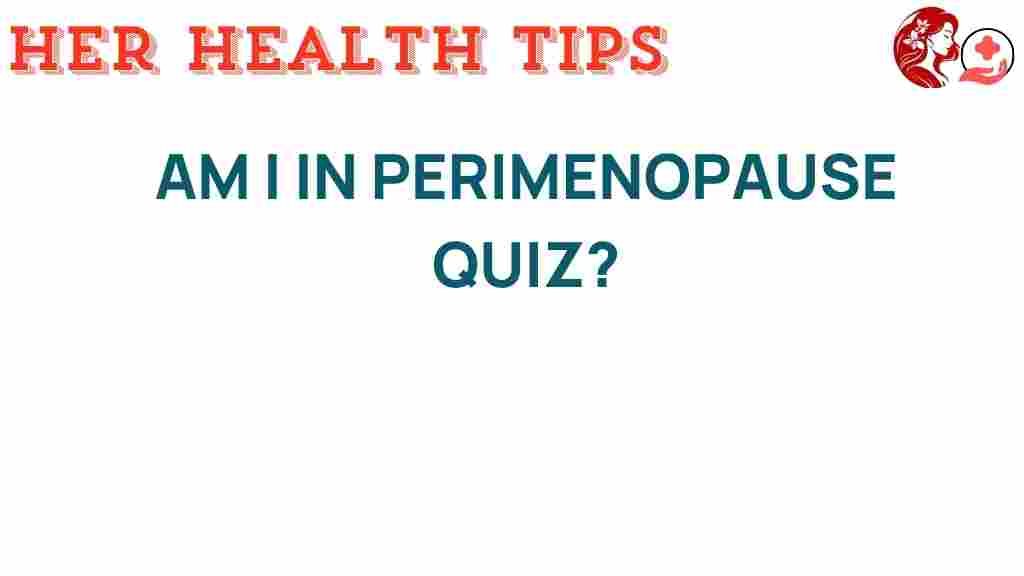Is Perimenopause Knocking? Take Our Quiz to Find Out!
As women approach their 40s, many begin to wonder if they are experiencing the early signs of perimenopause. This transitional phase can bring about various symptoms that are often overlooked or mistaken for other issues. Understanding women’s health during this vital time is crucial, especially with the significant hormone changes that occur. If you’re curious about whether perimenopause is knocking at your door, take our quiz and increase your awareness of this important phase in your life.
Understanding Perimenopause
Perimenopause is the period leading up to menopause, during which a woman’s body undergoes significant changes in hormone levels. This stage can last several years and is marked by various symptoms that can affect daily life.
- Age: Typically, perimenopause begins in a woman’s 40s but can start earlier for some.
- Fertility: This is also the time when fertility begins to decline.
- Menopause: Perimenopause leads to menopause, which is officially diagnosed when a woman has gone 12 months without a menstrual period.
Common Symptoms of Perimenopause
Women may experience a variety of symptoms during perimenopause, which can vary in intensity and duration. Some of the most common symptoms include:
- Irregular periods: Changes in menstrual cycle frequency and flow.
- Hot flashes: Sudden feelings of warmth that spread throughout the body.
- Sleep disturbances: Difficulty falling asleep or staying asleep.
- Mood swings: Increased irritability or emotional fluctuations.
- Vaginal dryness: Decreased moisture leading to discomfort.
- Memory issues: Forgetfulness or difficulty concentrating.
Recognizing these symptoms is the first step toward managing the changes that come with perimenopause.
Take the Perimenopause Quiz
Ready to assess your symptoms? Take our simple quiz to determine if perimenopause might be affecting you:
- Are your menstrual cycles becoming irregular?
- Do you experience hot flashes or night sweats?
- Have you noticed changes in your sleep patterns?
- Do you feel more irritable or emotionally volatile than usual?
- Are you experiencing vaginal dryness or discomfort during intercourse?
- Do you find it harder to concentrate or remember things?
If you answered “yes” to several of these questions, it might be time to speak with a healthcare professional about perimenopause and women’s health options available to you.
Steps to Manage Perimenopause Symptoms
Understanding perimenopause is essential, but knowing how to manage the symptoms is equally important. Here are some practical steps:
1. Stay Informed
Knowledge is power. Educate yourself about perimenopause and its symptoms so you can recognize what to expect.
2. Maintain a Healthy Lifestyle
Focus on a balanced diet rich in fruits, vegetables, whole grains, and lean proteins. Regular exercise can help alleviate mood swings and improve overall health.
3. Manage Stress
Incorporate stress management techniques such as yoga, meditation, or deep-breathing exercises into your routine.
4. Consult a Healthcare Provider
If symptoms are severe, consult a healthcare provider. They might suggest:
- Hormone replacement therapy (HRT)
- Non-hormonal medications
- Vaginal moisturizers or lubricants for dryness
5. Seek Support
Talk to friends, family, or support groups. Sharing experiences can help you feel less isolated during this transition.
Common Troubleshooting Tips
Experiencing specific challenges during perimenopause? Here are some troubleshooting tips:
Hot Flashes
- Dress in layers to adjust to temperature changes.
- Avoid triggers like spicy food, caffeine, and alcohol.
Sleep Disturbances
- Establish a relaxing bedtime routine.
- Limit screen time before bed to improve sleep quality.
Mood Swings
- Practice mindfulness and meditation to manage stress.
- Engage in regular physical activity to boost mood.
Conclusion
Understanding perimenopause and its accompanying symptoms is essential for every woman as she ages. By taking our quiz, you can evaluate your potential experiences with this transitional phase, leading to heightened awareness and proactive management of your women’s health. Remember, perimenopause is a natural part of the aging process, and seeking support, information, and medical advice can significantly improve your quality of life during this time.
For more information on managing perimenopause, visit WomensHealth.gov for resources and support options.
Remember, you are not alone in this journey. Embrace the changes with knowledge and confidence!
This article is in the category Reproductive and created by HerHealthTips Team
